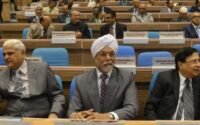Women in Constituent Assembly: In reference to the case of Hansa Mehta
This article has been written by Himansu Batar of IMS Unison University, Dehradun and curated by Naman Jain ofBennett University, Greater Noida.
In the past decade, we have seen a rise in the Women empowerment movements across the world. This has led to some significant changes giving new hope, heights, and horizons for women to grow while creating some deviances commonly called ‘pseudo-feminists’ or ‘feminizing’ who did not understand the real concept of ‘feminism.’ India has to offer some great inspiring females that truly depict the real image of feminism. Most important of them are the ‘Founding mothers’ of our constitution. Even though they were not given the same limelight that the male members received, Women have played a significant role in the Independence of India, and the part continued to be of the same importance while drafting the Constitution of India which is the supreme book of law that governs our state today. These women were reformists, lawyers, suffragettes, freedom fighters, and politicians. Despite being only 15 in number, these women played a significant role in making the constitution we know today.
As already mentioned, these women have not been in the limelight, and not much is known about their contribution to the constituent assembly; still, many of them left a notable mark with their works, and one such member was Hansa Jivraj Mehta, born on 3rd July in 1897 in Surat, Gujarat. Refusing a reserved seat, she took on the elections for the Bombay Legislative Council in 1937 as a general category candidate securing a victory, and till 1949, remained in power. During this time, Mehta got intimately involved with the All India Women’s Conference and became its president in 1946. During her presidency, she drafted the Indian Women’s Charter of Rights and Duties that demanded gender equality and civil rights for women. The year 1946 brought a golden opportunity for her, and she was offered to serve as a member of the United Nations sub-committee on the status of women. She was the vice-chair with Eleanor Roosevelt of the United Nations Universal Declaration of Human Rights Committee. Hansa Jivraj Mehta got the credit to replace the phrase “All men are born free and equal” to “All human beings are born free and equal.”
After strong participation in the freedom movement and the event of going to jail in this process, she also played a significant role in the framing of the Constitution of India. In the Assembly, she strongly argued in favour of women’s rights and intervened in debates on uniform civil code and reservation. She was the Member of Advisory Committee; of Sub-Committee on Fundamental Rights; and of Provincial Constitution Committee. She, along with Rajkumari Amrit Kaur, modelled the Indian Women’s Charter of Rights and Duties, and fought for the Uniform Civil Code (UCC). The issues that these women raised were of great significance and consisted of the following points:
- They dissented against the compulsory services by state warning against the dangers of giving the state, the power of compulsion in any sphere of life.
- They argued against restricting the scope and power of the right to freedom of religion as a fundamental right to ensure that no future legislature is made to promote evils like child marriage and the Parda system in the name of freedom of religion.
- They wanted a Universal civil code within 5-10 years for the whole country.
- They argued a lot on the topic of national language and they also proposed for taking Roman script as an alternative to Persian script and Devnagri script keeping in mind the welfare of minorities like Christians, Jews etc.
Not only this, but the women in the Constituent Assembly stood together against any special treatment or political status for women, and they see it as a wrong value entering the sphere of Women and their fight for true equality amongst genders in the society.
The women representation in the legislature has always been a question for us. The percentage of women representation has been declining tremendously in the last decades. The present government, however, has given quite a significant representation of women in legislature, and not only that, but some of the most important ministries are now under the leadership of these prominent women. They are showing the world how efficient a woman can be in government mechanisms. We have to look into the lives of these eminent women and their ideologies to understand the true meaning of feminism and how to achieve it in today’s world. Let us remember these ‘founding mothers’ and thank them for their contribution in giving us the most important and fantastic enactment that is making our life wonderful, i.e., The Constitution of India.
References:
https://www.constitutionofindia.net/constituent_assembly_members/hansa_jivraj_mehta
https://www.shethepeople.tv/sepia-stories/india-women-draft-constitution/
https://www.drishtiias.com/blog/women-of-the-drafting-committee-of-the-indian-constitution
UN Chief honours Indian reformer Hansa Mehta’s role in shaping Universal Declaration of Human Rights – The Economic Timeseconomictimes.indiatimes.com


